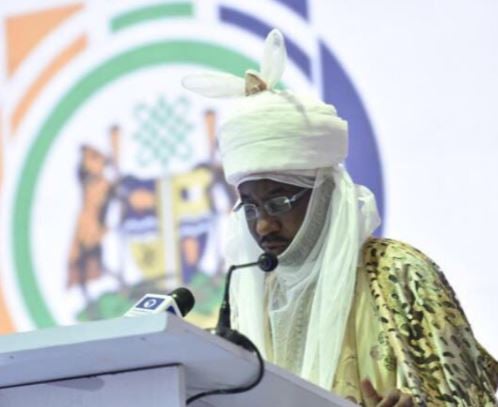
Raphael Kanu
The Emir of Kano and former Governor of the Central Bank of Nigeria (CBN), Muhammadu Sanusi II, has warned ministers and presidential aides against becoming praise singers instead of offering honest and constructive advice to the President.
Sanusi issued the warning on Monday in Abuja during the Oxford Global Think Tank Leadership Conference and Book Launch, where he and Atedo Peterside examined Nigeria’s economic and governance challenges.
Speaking on the need for integrity and courage in public service, the Emir said Nigeria’s leadership crisis has been worsened by sycophancy, as many government officials prefer to flatter the President rather than tell him the truth.
“Our leaders listen, but only to those who tell them what they want to hear,” Sanusi said. “Nigeria has too many sycophants in the government. Those who speak the truth are branded enemies of the state.”
He condemned the trend of excessive praise at official functions, saying it discourages honest feedback and undermines good governance.
“You sit in a meeting and the President is there. The first thing people say is, ‘Mr. President, thank you for your great leadership. God has blessed Nigeria by giving us you,’” he remarked. “After laying that foundation, it is their advice the President listens to. But when you tell the truth, you are seen as an enemy.”
Sanusi urged government officials to uphold the principles of honesty and accountability, stressing that loyalty should never mean blind obedience.
“Those who work with the President must understand that it is not in their interest to become praise singers,” he said. “You bring shame upon yourself and your office when you do that.”
Turning to economic issues, the Emir commended the Tinubu administration for removing fuel subsidy and unifying exchange rates, describing both measures as “painful but necessary.” However, he warned that these reforms would fail without discipline in public spending and strong institutional oversight.
“If you stop paying subsidies but continue borrowing excessively, you’ve filled one hole only to dig another,” Sanusi stated. “The real challenge now is how the government manages its revenues and spends responsibly.”
Sanusi, who served as CBN Governor between 2009 and 2014, traced the current economic hardship to years of inconsistent policies and populist politics. He recalled that those who resisted subsidy removal in 2012 are the same people now implementing it.
“In 2012, we said the subsidy was unsustainable, but politics took over. Now, those who led the protests have inherited the same problem and had no choice but to do the right thing,” he said.
He commended the professionalism of Finance Minister Wale Edun and CBN Governor Yemi Cardoso, noting that their steps toward stabilizing inflation and the exchange rate were commendable. Still, he insisted that the government must cut waste, reduce the size of the cabinet, and lead by example.
“Why do we need 48 ministers? Why the long convoys and endless travel allowances?” he asked. “We cannot preach sacrifice to citizens while living extravagantly at the top.”
The conference, themed “Reimagining Leadership and Governance in a Changing Africa,” brought together policymakers, development experts, and scholars to explore strategies for institutional reform and effective governance.
Also speaking, Peterside, founder of Stanbic IBTC Bank, echoed Sanusi’s warning on fiscal recklessness. He said the government must demonstrate that savings from subsidy removal are being used to improve citizens’ lives.
“Pain does not automatically produce gain,” Peterside said. “Gain only comes if the government spends wisely, cuts waste, and protects the poor.”
Both speakers agreed that Nigeria’s recovery depends on moral renewal and integrity in leadership.
“Good policy without good governance is like planting a tree and refusing to water it,” Sanusi concluded. “Our leaders must stop surrounding themselves with praise singers and start listening to the truth — even when it hurts.”
